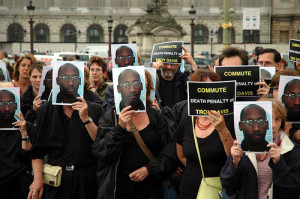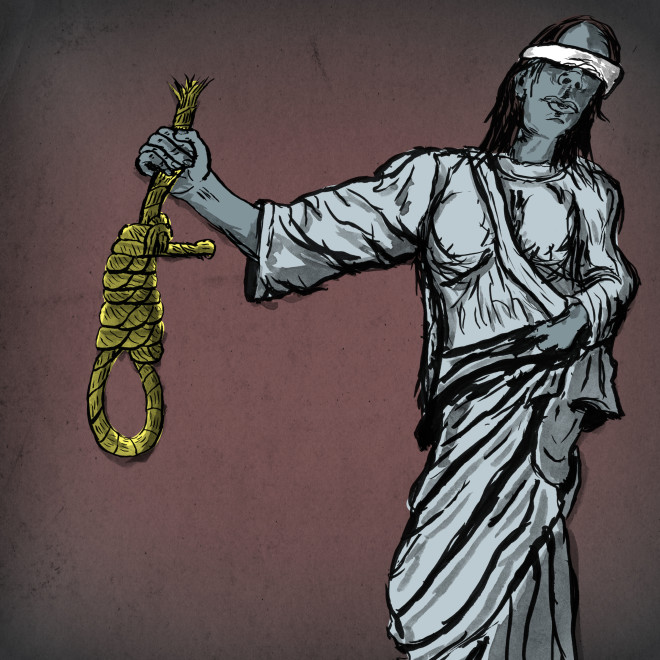Troy Davis: One More Casualty of the Justice System
 Outside of a Georgia prison the night of September 21, nearly 500 people sat and hoped to hear something good, news that one man would live to see another day. They waited for hours to learn the outcome, only to hear at 11:08 P.M. that Troy Davis had died of lethal injection. Davis’ tragic story began in 1989 when the state of Georgia brought charges against him for the shooting of Michael Cooper, the beating of Larry Young, and the murder of Officer Mark MacPhail. At the conclusion of the 1991 trial, a jury found him guilty of murder, among other lesser offenses, and only two days later recommended the death penalty. During his 20-year legal battle, Davis fought to convince the public of his innocence and started to draw even more attention after the recantations of seven out of the nine eyewitnesses. Shocked by the lack of other substantial evidence in the case, many people not only in the United States but also around the globe doubted that there was enough proof to condemn this man to death. To many, Davis’ case soon came to represent the injustice of the death penalty due to the potential for wrongful executions.
Outside of a Georgia prison the night of September 21, nearly 500 people sat and hoped to hear something good, news that one man would live to see another day. They waited for hours to learn the outcome, only to hear at 11:08 P.M. that Troy Davis had died of lethal injection. Davis’ tragic story began in 1989 when the state of Georgia brought charges against him for the shooting of Michael Cooper, the beating of Larry Young, and the murder of Officer Mark MacPhail. At the conclusion of the 1991 trial, a jury found him guilty of murder, among other lesser offenses, and only two days later recommended the death penalty. During his 20-year legal battle, Davis fought to convince the public of his innocence and started to draw even more attention after the recantations of seven out of the nine eyewitnesses. Shocked by the lack of other substantial evidence in the case, many people not only in the United States but also around the globe doubted that there was enough proof to condemn this man to death. To many, Davis’ case soon came to represent the injustice of the death penalty due to the potential for wrongful executions.
As the most publicized death penalty case in recent years, Davis quickly gained the support of the Innocence Project, an organization dedicated to exonerating wrongly convicted criminals and reforming the criminal justice system. The group cites invalid forensic evidence, false confessions, eyewitness misidentification, and incompetent defense as the most common causes of wrongful conviction. Since its founding in 1992, 273 people have been exonerated, 17 of whom were on death row and were freed by DNA evidence. Hoping to help Davis as well, the organization consulted with his legal team and submitted an amicus curiae brief. Now that the efforts of not only the Innocence Project but also the global public failed, the group has redoubled their efforts to have a moratorium on the death penalty reinstated until the underlying causes of wrongful conviction can be resolved.
Although awareness of such judicial failures grows each year, one of the largest threats to a moratorium is the apparent indifference of the public towards these unforgiveable mistakes. In a 2009 Gallup poll, 59% of US citizens thought that an innocent person had been executed in the past five years, while the same poll found that 65% approved of the death penalty in murder cases. There is a definite, disturbing overlap of people in the United States who acknowledge these tragic mistakes but do not appear to care.
Texas Governor and potential Republican presidential candidate Rick Perry represents the other type of death penalty supporter: the one who champions the reliability of the justice system and embraces the punishment completely. Perry, who has presided over 234 executions as governor of Texas, claimed during one of the Republican debates that the post-conviction exonerations in his state are in and of themselves proof that the system works. In his mind, the finding of judicial error in some cases shows that mistakes can be discovered and that if other cases had mistakes, they would have been discovered as well. Even a high school student could point out the logical fallacy in his argument: just because something has not been proven false does not guarantee that it is true.
For example, Perry has come under scrutiny for the supposed wrongful execution of Cameron Todd Willingham, convicted of murdering his three daughters by arson. The arson evidence was not conclusive at the time, so experts turned to Perry to postpone the execution in order to further investigate these suspicions. Perry did nothing, and Texas executed Willingham on February 17, 2004. Not only do experts now believe that Willingham was innocent, but Perry also used his power to stop a 2009 investigation into the case by replacing the chairman and two other members of the State Forensic Science Commission. Perry’s insistence represents one of the biggest problems that capital punishment opponents face today: a belief in the infallibility of the justice system.
The country is at a critical point in the death penalty debate. As more and more people accept DNA evidence and realize its implications in convictions, fewer people should approve of capital punishment. Although only one of the many ways to exonerate innocent prisoners, the conclusive results that forensics can provide are often priceless. With wrongful convictions on the minds of citizens, now is the time to push for a moratorium on the death penalty until these problems are resolved. Because of the inherent finality of the death penalty, a government should only apply it when absolutely certain that the accused person is guilty. If necessary, a state can release a wrongfully imprisoned man, but it can never restore the life of a wrongfully executed man. This distinction should be the key to the debate at this point in time: whether or not the punishment is morally right is an argument for another day.
Still, the death penalty should not be continued until a high standard of proof is reached. Some critics will contend that a government cannot ever be entirely certain about convictions. Crimes in the real world rarely have the specific DNA evidence, perfect eyewitness accounts, or other wholly reliable proof shown in TV crime dramas. Even as technology develops further, the government may never be able to guarantee that a conviction is correct. But if society never reaches that point, so be it. Until the government can guarantee that all people who are executed are definitively guilty, moratorium on the death penalty should be in place, thus saving the lives of potentially hundreds of innocent citizens.

2 Comments
Join the discussion and tell us your opinion.
Troy Davis & The Innocent Frauds of the anti death penalty lobby
Dudley Sharp
The Troy Davis campaign, like many before it (1), is a simple, blatant fraud, easily uncovered by the most basic of fact checking (1).
The case for Davis’ guilt is overwhelming, just as were his due process protections, which may have surpassed that of all but a few death row inmates.
The 2010 federal court innocence hearing found:
” . . . Mr. Davis is not innocent: the evidence produced at the hearing on the merits of Mr. Davis’s claim of actual innocence and a complete review of the record in this case does not require the reversal of the jury’s judgment that Troy Anthony Davis murdered City of Savannah Police Officer Mark Allen MacPhail on August 19, 1989.” (2)
“Ultimately, while Mr. Davis’s new evidence casts some additional, minimal doubt on his conviction, it is largely smoke and mirrors.” (2)
“As a body, this evidence does not change the balance of proof that was presented at Mr.
Davis’s trial.”(2)
“The vast majority of the evidence at trial remains intact, and the new evidence is largely not credible or lacking in probative value.” (2)
None of this came as a surprise to anyone who actually followed the case, in contrast to the Save Troy Davis folks who were, willingly, duped.
1) a) “Troy Davis: Worldwide anti death penalty deceptions, rightly, failed”,
http://homicidesurvivors.com/2011/09/25/troy-davis-worldwide-anti-death-penalty-deceptions-rightly-failed.aspx
b) “Troy Davis fairly convicted, not ‘railroaded’ ”
http://savannahnow.com/column/2011-10-06/column-spencer-lawton-troy-davis-fairly-convicted-not-railroaded
2) “Innocence Hearing”, ordered by the US Supreme Court, US DISTRICT COURT, in the SOUTHERN DISTRICT OF GEORGIA, SAVANNAH DIV.,RE TROY ANTHONY DAVIS, CASE NO. CV409-130
http://multimedia.savannahnow.com/media/pdfs/DavisRuling082410.pdf
That comment is copy-paste horseshit. (1)
1. Sharp, Dudley. “Troy Davis & The Innocent Frauds of the Anti Death Penalty Lobby.” Web log comment. WUPR.org. Washington University Political Review, 30 Oct. 2011. Web. 3 Nov. 2011.